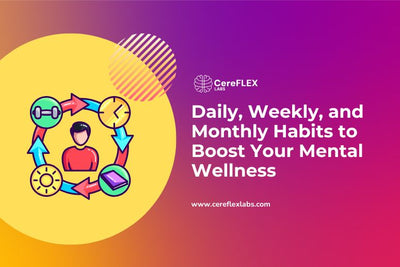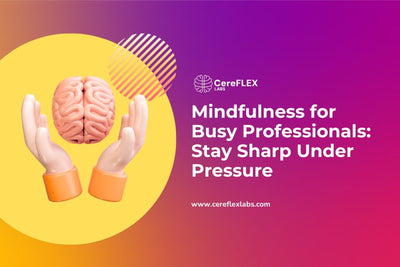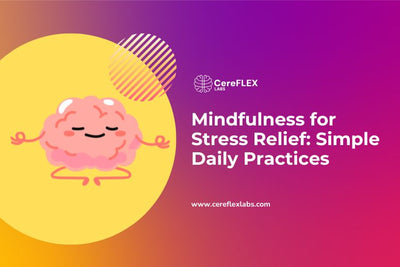Exercise is often associated with stronger muscles or a healthier hear, but its impact on the brain is just as powerful.
Regular movement supports mental clarity, emotional balance, and long-term cognitive performance. It boosts mood, sharpens memory, enhances focus, and may even slow age-related decline.
In an age where stress, anxiety, and burnout are increasingly common, physical activity offers a natural, science-backed way to support mental wellness. And it doesn’t require extreme routines or high-level fitness. Even light, consistent movement can improve how you think and feel.
This guide explores how exercise fuels your brain through better blood flow, boosted neurotransmitters, and increased neuroplasticity. You’ll also learn which types of activity offer the most mental benefits and how to combine movement with tools like the Cereflex Labs AM/PM Protocol for even stronger cognitive support.
Small steps, big shifts—starting with movement.
Here is the Quick Answer |
|
Exercise is one of the most powerful ways to support mental and cognitive health. Regular physical activity improves mood, focus, memory, and sleep. It also helps protect against anxiety, depression, and brain fog. Cardio, strength training, and mindful movement each offer unique benefits. To take your results further, Cereflex Labs’ AM/PM Protocol delivers targeted nutritional support for daily brain performance, stress resilience, and mental clarity. |
The Science Behind Exercise and Brain Health
Exercise doesn’t just benefit your heart and muscles. It has a direct, measurable impact on brain performance. Modern neuroscience confirms that physical activity activates multiple processes that protect, enhance, and regenerate cognitive function.

1. Increased Blood Flow to the Brain
When you exercise, your heart pumps more oxygen-rich blood throughout your body, including to your brain. This circulation fuels areas involved in memory, attention, and learning.
In one randomized controlled trial, participants who engaged in moderate-intensity continuous training (MICT) showed greater improvements in both executive function and cerebral blood flow than those doing high-intensity interval training (HIIT). MICT was especially effective in enhancing cognition by improving circulation to key brain regions.1
Another study found that just 20 minutes of moderate cycling boosted blood flow to the hippocampus (your brain’s memory centre) by 10–12%, and this effect lasted up to an hour post-exercise.2
These findings suggest that regular movement doesn’t just sharpen your thoughts in the moment. It builds brain health over time.
2. Stimulation of Brain-Derived Neurotrophic Factor (BDNF)
BDNF is a protein that plays a key role in maintaining healthy brain cells and forming new neural connections. It’s critical for memory, learning, and emotional regulation.
Exercise consistently increases BDNF levels in both the blood and muscles.3 This boost helps explain why physically active people tend to enjoy better mental clarity and emotional stability. While more research is needed to fully understand the mechanism, BDNF is considered a major link between movement and improved brain function.
3. Neurogenesis and Neuroplasticity
Exercise helps your brain grow and adapt—literally. Physical activity stimulates neurogenesis (the creation of new brain cells) and neuroplasticity (the brain’s ability to rewire itself).
Systematic reviews have shown that exercise increases the production of neurotrophic factors like BDNF, NGF, and GDNF, all of which support neuron growth and survival.4 It also upregulates receptors that help your brain respond to these signals, strengthening pathways for memory and learning.
The result? A more flexible, resilient brain that can learn faster, adapt to stress, and stay sharper with age.
4. Natural Mood Boosters: Dopamine, Serotonin, and Endorphins
During exercise, your brain releases a surge of feel-good neurotransmitters:
- Dopamine for motivation and focus
- Serotonin for emotional balance
- Endorphins for natural pain relief and euphoria
This chemical cascade is why a workout can leave you feeling mentally refreshed, even after a short session.
Mental Health Benefits of Physical Activity
You don’t have to be a marathon runner to experience the profound mental health benefits of movement. Even a daily walk can help regulate mood, calm the nervous system, and support emotional balance.
Research consistently supports exercise as one of the most effective natural tools for improving mood and mental well-being.

Depression Relief
A meta-analysis of 218 randomized trials with over 14,000 participants confirmed that exercise (particularly walking, jogging, yoga, and strength training) can significantly reduce symptoms of major depression.5
These effects are linked to several mechanisms:
- Growth of new brain cells
- Reduced inflammation
- Release of endorphins
- Healthy distraction from negative thought patterns
Exercise helps interrupt the cycle of rumination and can enhance the impact of other treatments like therapy or medication.
Anxiety Reduction
Physical activity can help lower both the intensity and frequency of anxiety symptoms. It triggers biological changes that ease tension, while also offering a positive outlet for nervous energy.
Some studies show that consistent exercise not only reduces existing anxiety but may also lower the risk of developing anxiety disorders. It works by:
- Reducing excess cortisol (a stress hormone)
- Enhancing mood-regulating neurotransmitters
- Supporting better sleep and recovery
While more research is needed, the psychological and physiological effects of exercise make it a powerful tool for managing anxiety.6
Stress Reduction
Exercise may not eliminate stress, but it helps reduce its emotional toll. In one study, participants who exercised at least once a week had lower resting heart rates—an indicator of better resilience.
Although their immediate physical reactions to stress (e.g., heart rate spikes) were similar to non-exercisers, those who exercised experienced less emotional distress afterward. This suggests that while physical responses may remain, the emotional impact of stress is softened by regular activity.7
Improved Sleep Quality
Movement helps regulate your circadian rhythm. Light to moderate exercise, especially when done earlier in the day, can help you fall asleep faster and enjoy deeper, more restorative sleep.
Better sleep supports everything from mood stability to memory and stress management, making it a core pillar of mental clarity.
Increased Self-Esteem
Reaching even small fitness goals can reinforce confidence, autonomy, and a sense of progress. Over time, these wins compound, improving both self-image and motivation.
Better Emotional Regulation
Physical activity enhances executive function—the brain’s ability to manage impulses, navigate emotions, and choose thoughtful responses over reactivity. This helps reduce mood swings and increases resilience during challenging moments.
Better Cognitive Performance and Brain Function
Exercise strengthens brain regions responsible for attention, planning, and problem-solving. Regular aerobic activity preserves brain volume, boosts processing speed, and protects against age-related cognitive decline.
The cognitive benefits are especially pronounced when movement is paired with a brain-healthy diet and other wellness habits.8
Sharper Focus and Attention
Physical activity increases dopamine and norepinephrine levels—neurotransmitters that regulate attention and mental alertness.
This makes exercise a promising complementary strategy for managing attention disorders like ADHD. While short-term aerobic exercise shows immediate improvements in focus, more long-term studies are needed.9
Better Memory and Learning
Exercise boosts hippocampal function, which plays a critical role in learning and memory. It also stimulates BDNF, the brain’s growth factor that enhances neural plasticity and strengthens memory pathways.
Regular movement has been shown to improve recall, cognitive flexibility, and speed of learning across all age groups.
What types of exercise are best for the brain?
All movement is beneficial, but certain types of exercise have especially strong evidence for supporting brain health. The key is to find an activity that’s enjoyable and sustainable, so you can stay consistent over time. From cardio to strength training to gentle mind-body practices, each form contributes in different ways.
1. Aerobic/Cardio Exercise
 Cardio exercises like walking, running, cycling, swimming, or dancing are some of the most studied for cognitive benefits. These activities:
Cardio exercises like walking, running, cycling, swimming, or dancing are some of the most studied for cognitive benefits. These activities:
- Boost heart rate and increase blood flow to the brain
- Elevate dopamine and serotonin for mood and motivation
- Stimulate BDNF (brain-derived neurotrophic factor) to support learning and memory
Cardio is particularly effective for improving mental clarity, reducing depression and anxiety, and enhancing sleep quality.
2. Strength Training

Lifting weights or using resistance bands does more than build muscle. It also benefits the brain.
Research shows that strength training twice a week can:
- Improve executive function and decision-making
- Support faster processing speeds
- Help reduce inflammation and balance insulin, both of which affect cognitive aging
It’s especially effective for older adults looking to maintain mental sharpness.
3. Mind-Body Practices

Gentle, integrative exercises like yoga, tai chi, and Pilates pair movement with breath and mindfulness.
These practices are ideal for:
- Reducing stress and anxiety
- Improving emotional regulation
- Enhancing body awareness and calm focus
They’re also accessible to people of all fitness levels and are especially helpful for those dealing with chronic fatigue, pain, or mental overwhelm.
When to Seek Professional Support
While exercise is one of the most accessible and impactful tools for brain health, it may not be enough on its own, especially if you’re navigating persistent mental fatigue, low mood, or cognitive challenges that don’t improve with lifestyle changes.
Consider speaking with a healthcare provider or mental health professional if:
- Your focus, energy, or memory remain impaired despite regular exercise and healthy habits
- You’re struggling with chronic stress, sleep issues, or emotional dysregulation
- You’ve tried to build consistent routines but feel stuck or overwhelmed
- You’re looking for more structured, personalized support to complement your efforts
These signs don’t mean you’ve failed. They simply signal that your brain and body may need more targeted strategies or supplementation to restore balance.
Cereflex Labs: A Wellness-Oriented Approach to Cognitive Support
At Cereflex Labs, we understand that cognitive wellness is multifaceted. That’s why we created the AM/PM Protocol—a two-part daily supplement system designed to complement lifestyle habits like exercise, sleep, and stress management.
This protocol provides targeted nutritional support to help you stay mentally clear, emotionally balanced, and cognitively resilient throughout the day and night.
AM – Brain Morning Formula
Formulated to jump-start your day, the AM formula supports:
- Focus and attention
- Peripheral circulation
- Brain energy and performance
- Nutrient-based antioxidant protection
PM – Cognitive Support Evening Formula
Designed to wind you down gently, the PM formula helps support:
- Cognitive restoration during sleep
- Cellular protection from oxidative stress
- Relaxation and recovery
What Makes the AM/PM Protocol Different?
- Includes essential vitamins and minerals linked to cognitive health
- Provides antioxidants to protect against free radical damage
- Supports healthy circulation and nutrient delivery to the brain
- Designed to fit seamlessly into a balanced, wellness-focused lifestyle
If you’re looking to complement your fitness and mental health routines with safe, science-informed cognitive support, the Cereflex AM/PM Protocol offers a practical and proactive way to do just that.
Learn more about best natural nootropics for athletes here.
Conclusion
Exercise is one of the most accessible and effective tools for supporting your brain—not just your body. Whether you’re lacing up for a brisk walk, lifting weights, or stretching in a quiet room, movement helps sharpen focus, stabilize emotions, and protect long-term brain health.
The mental health benefits of exercise are well-established: better mood, deeper sleep, reduced anxiety, improved memory, and clearer thinking. But to get the most out of your efforts, it helps to combine physical activity with other science-backed routines that nourish your brain from the inside out.
That’s where Cereflex Labs comes in. Our AM/PM Protocol is designed to work with your lifestyle, offering daily cognitive support that aligns with your body’s natural rhythms—morning to night.
You don’t have to overhaul your life overnight. But by taking consistent steps through movement, sleep, nutrition, and brain support, you can build lasting clarity, resilience, and mental energy.






